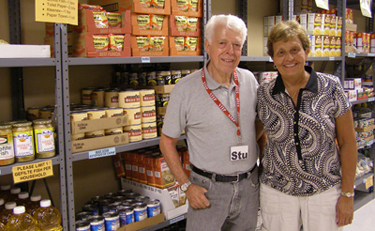In the midst of a capital campaign to finance the purchase of its new building, STEP reaches out to community for help in feeding its hungry neighbors — some of them Jewish
By JOSH LIEBERTHAL
Whoever saves a life, it is considered as if he saved an entire world.
— Babylonian Talmud, Sanhedrin 4:8 (37a)
For 35 years, the St. Louis Park Emergency Program (STEP) has provided food, clothing and other assistance to community members in need, including some Jewish families. After three moves in the past 18 months, STEP has finally settled into its new permanent home at 6812 W. Lake St. and is reaching out to the community for their support.
The STEPing Forward Capital Campaign, co-chaired by Elissa Heilicher and Camille Schroeder, has set a goal to raise $1.3 million by June 2011 to cover the cost of the new building’s mortgage. The purchase price of the building was $850,000, with an additional $50,000 to $60,000 in building necessities, such as a sprinkler system and a fire emergency door.
Locally, STEP has received grants from the Bremer Foundation and the Mount Sinai Foundation, among others, but most grants will not contribute funds to a capital campaign.
“We have finally found a building, bought the building, and now we have to raise the money to pay off the mortgage,” said Heilicher, who is a longtime STEP volunteer.
So far, the campaign has raised around $800,000. STEP is encouraging individuals and businesses to commit to donating to the campaign.
The organization recently announced a $100,000 challenge grant from an unnamed donor, which will match, dollar for dollar, funds raised for the campaign until the end of December.
Jackie Olafson, STEP executive director, is very excited about this new fundraising opportunity.
“For every dollar that somebody donates to the campaign, their dollars will double and we really hope we can maximize that gift,” Olafson said.
 Food shelf volunteer Stu Yellen is pictured with executive director Jackie Olafson in STEP’s new building on Lake Street in St. Louis Park. (Photo: Erin Elliott Bryan)
Food shelf volunteer Stu Yellen is pictured with executive director Jackie Olafson in STEP’s new building on Lake Street in St. Louis Park. (Photo: Erin Elliott Bryan)
More than 10 percent of St. Louis Park residents receive services from STEP in some way — including 35 Jewish families who used the resources last year. STEP offers a food shelf, which includes kosher meat and other kosher products, as well as a clothes closet and book shelf. Additionally, STEP can offer emergency rent or medical assistance when it is able.
Each time a client arrives they have a 30-minute appointment with one of four licensed social workers, who assess the client’s need. Some clients prefer to spend their 30-minute appointments talking over such things as family or financial issues, while others speak briefly before gathering the food they need.
STEP currently has the largest selection of kosher food, including meats, in comparison to any other food shelf in the Twin Cities metro area. STEP supplies about 8,600 pounds of kosher food each year, but the majority of it has to be purchased.
About 25 percent of STEP’s overall food purchases are for kosher products — averaging about $1,000 per month.
“We value our food at about $1 per pound overall and we figure kosher food is about $3 to $4 a pound,” Olafson said. “But we are very intentional about making sure that we have kosher meat and food.”
STEP purchases about 16 percent of their overall food inventory, while 20 percent is donated by the community. The rest comes from commercial sources, such as the Agricultural Bill and the Commodities Program, which is run by the U.S. Department of Agriculture, in an effort to keep food shelves full.
STEP encourages donations of food as well as gently used clothing and books, which can be dropped off during business hours. The organization is always in constant need of paper grocery bags, laundry detergent, toilet paper and kosher foods.
Olafson encourages people to make thoughtful donations.
“Please donate food that’s more current that you would use, please donate clothes that you still would put on if you wanted to wear them or they still were your size,” she said.
Monetary donations, to purchase food or for the capital campaign, can be made at the STEP location or online. People will be asked to specify where the funds are to be allocated; only donations earmarked for the capital campaign will be matched by the $100,000 challenge grant.
In addition, there is always an open spot for volunteers. Whether it’s once a year or once a week, any time spent helping at STEP is greatly appreciated. STEP has more than 120 volunteers each week, some of them Jewish, including former grocery store owner Stu Yellen, who stocks shelves, and Clare Schwartz, who answers the office phone on Wednesdays.
“Once I retired I needed something to do with my time,” said Schwartz, who has been a volunteer for 10 years. “So my sister said, ‘Go to STEP.’”
Heilicher reiterated that needs exist in the Jewish community. The 35 Jewish families that STEP serves visited the food shelf 155 times in the last year. For one family in particular, STEP is their only source for kosher meat because they cannot afford it otherwise.
“The Jewish community needs to have representation here,” Heilicher said. “We need to support this, because we are part of the community, we are a large part of the community.”
***
Josh Lieberthal is an intern at the American Jewish World.
(American Jewish World, 7.23.10)










 Food shelf volunteer Stu Yellen is pictured with executive director Jackie Olafson in STEP’s new building on Lake Street in St. Louis Park. (Photo: Erin Elliott Bryan)
Food shelf volunteer Stu Yellen is pictured with executive director Jackie Olafson in STEP’s new building on Lake Street in St. Louis Park. (Photo: Erin Elliott Bryan)









